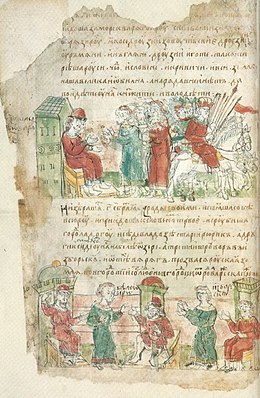
The calling of the Varangians, calling of the (Varangian) princes or invitation to the Varangians[a] (Russian: призвание варягов, romanized: prizvaniye varyagov; Ukrainian: покликання варягів, romanized: poklykannya varyahiv) is a legend[8][9][10][11] about the origins of the Rus' people, the Rurik dynasty and the Kievan Rus' state, recorded in many divergent versions in various manuscripts and compilations of Rus' chronicles. These include the six main witnesses of the Primary Chronicle (PVL; mainly the Laurentian (Lav.), Hypatian (Ipat.), and Radziwiłł (Rad.)) and the Novgorod First Chronicle (NPL), as well as later textual witnesses such as the Sofia First Chronicle and the Pskov Third Chronicle.
The common tradition is that some Slavic and Finnic tribes living east of the Baltic Sea were at some point paying tribute to the Varangians, then revolted and drove them back across the sea, only to then descend into inter-tribal conflict.[12][10] To resolve this situation, the tribes agreed to seek a prince to reign over them and restore order, and for that they went across the sea to the Varangians and invited the three brothers Rurik, Sineus and Truvor to do so.[13][10] After supposedly establishing themselves in either Novgorod (most texts) or Staraya Ladoga (Ipat.), Beloozero and Izborsk (most texts) or "Slovensk"[b] (P3L), respectively,[14] two of the brothers died, and Rurik became the sole ruler of the territory.[10] According to a later Muscovite church tradition developed in the 16th century, this made him the legendary progenitor of the Rurik dynasty, although primary sources before the mid-15th century appeared to be either completely unaware of Rurik's existence, or not particularly concerned with identifying him as the founder of a dynasty.[15]
- ^ Cross & Sherbowitz-Wetzor 1953, p. 29.
- ^ Cross & Sherbowitz-Wetzor 1953, p. 20.
- ^ Cross & Sherbowitz-Wetzor 1953, p. 32, 34, 39, 47, 50.
- ^ Plokhy 2006, p. 23, 27, 28.
- ^ Magocsi 2010, p. 65.
- ^ Plokhy 2006, p. 30.
- ^ Duczko 2004, p. 12.
- ^ Cross & Sherbowitz-Wetzor 1953, p. 32.
- ^ Plokhy 2006, p. 28.
- ^ a b c d Martin 2009b, p. 3.
- ^ Ostrowski 2018, p. 47.
- ^ Cross & Sherbowitz-Wetzor 1953, p. 38.
- ^ Cross & Sherbowitz-Wetzor 1953, p. 38–39.
- ^ Magocsi 2010, p. 55, 59–60.
- ^ Ostrowski 2018, p. 31.
Cite error: There are <ref group=lower-alpha> tags or {{efn}} templates on this page, but the references will not show without a {{reflist|group=lower-alpha}} template or {{notelist}} template (see the help page).